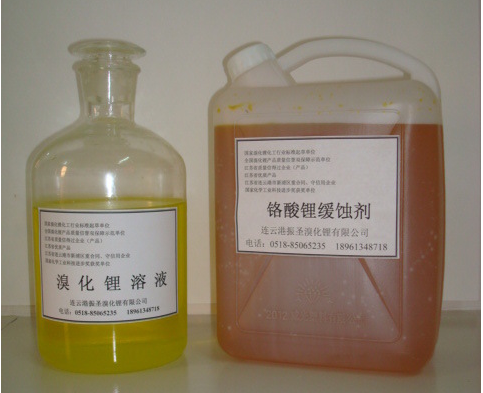Factors Affecting Corrosion of Metallic Materials by LiBr Solution
LiBr solution plays a crucial role in the operation of Hope Deepblue's LiBr absorption chillers and heat pumps, as it is integral to the heat exchange and refrigeration process. However, it can also affect the unit in several ways, particularly in terms of corrosion of metallic components.
Factors Affecting Corrosion of Metallic Materials by LiBr Solution:
- LiBr Solution Concentration
The concentration of the LiBr solution directly impacts the oxygen content within the absorption unit. A lower concentration increases the oxygen content, which can accelerate the corrosion of metal parts in the system. - LiBr Solution Temperature
Higher temperatures increase the reaction rate between the LiBr solution and the materials in the system. This can lead to faster corrosion, as elevated temperatures enhance the chemical reactions that contribute to material degradation. - pH Value
If the pH value of the LiBr solution is too acidic or too alkaline, it can further exacerbate corrosion. Maintaining an optimal pH is crucial to preventing the corrosive effects of the solution on the unit's metal components.
By carefully monitoring and controlling these factors, Hope Deepblue ensures the longevity and efficiency of its LiBr absorption chillers and heat pumps, providing customers with reliable and durable products.

Several measures can be implemented to slow down the corrosion of metal components by the LiBr solution:
- Ensure a Vacuum Environment
Maintaining a vacuum inside the LiBr absorption unit helps prevent the entry of oxygen from the air, reducing the likelihood of oxidation and subsequent corrosion of the metal surfaces. - Add Corrosion Inhibitors
Corrosion inhibitors, such as lithium chromate (0.1% - 0.3%) or lithium molybdate, can be added to the LiBr solution. These inhibitors form a protective film on the surface of the metal, preventing direct contact with the corrosive solution. Additionally, small amounts of corrosion inhibitors can be periodically replenished to maintain effectiveness. - Control pH with Lithium Hydroxide
The pH of the LiBr solution should be maintained within a specific range to minimize corrosion. Adding lithium hydroxide helps keep the pH level between 9.0 and 10.5, which is the optimal range where metals corrode the slowest. This helps ensure that the metal components of the unit remain protected over time.
These strategies collectively help extend the lifespan of the metal components in LiBr absorption units, improving the reliability and durability of the system.
Post time: Mar-08-2024





